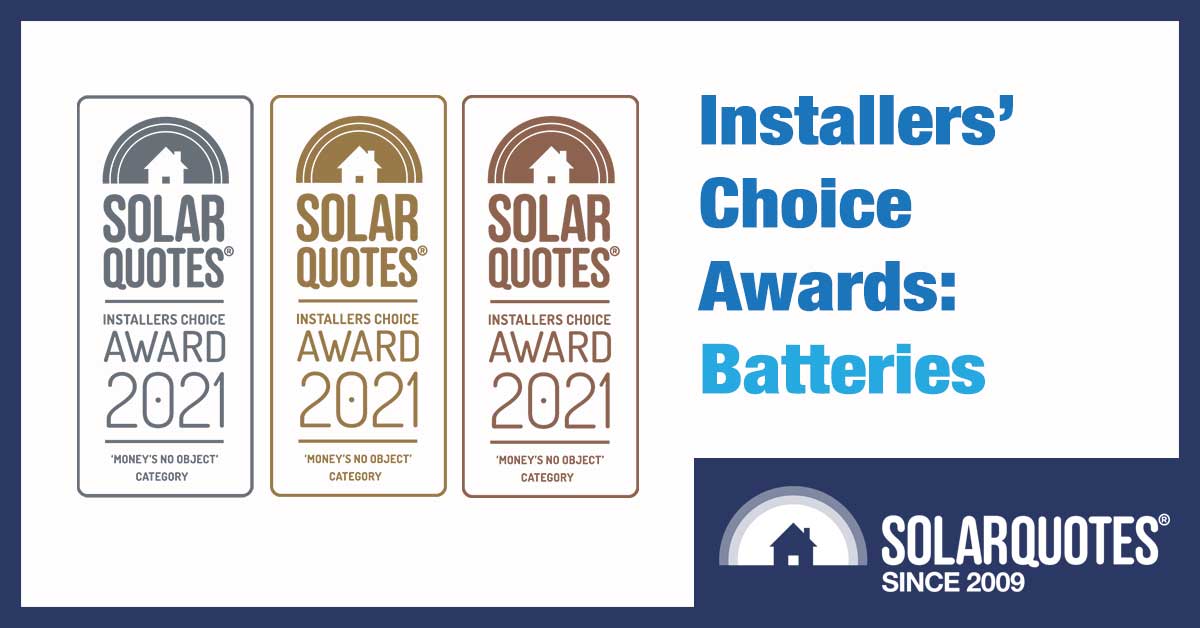
If one renewable energy technology for your home deserves particularly careful due diligence, it’s the home battery system. A solar battery is an incredibly dense box of energy. If something goes wrong, the consequences could be dire.
Home battery systems are a relatively immature market with a bunch of entrants jumping on board, many of whom seem to be struggling with long term reliability.
But battery storage is also a vital part of the world’s march to renewable energy generation. If we’re going to get to 100% renewables, we’ll need to deploy both large and small scale batteries quickly, networking them in Virtual Power Plants (VPPs) to support the inherently variable output of wind and solar power systems.
And at the end of the day, we are all comfortable carrying lithium-ion batteries in our pockets, so we shouldn’t be scared of installing a good solar battery brand in our homes.
But which brands can you trust? As with the recently published SolarQuotes Installers Choice Awards 2021 for solar panels and solar inverters, we thought we’d ask the installers in the SolarQuotes network.
SolarQuotes Installers’ Choice Awards For Batteries: 2021
To try and tease out which solar batteries installers trust, we asked 2 separate questions:
- What battery brand would you put on your own house if money was no object?
- What battery brand would you put on your own house if money was tight?
Note: Choosing good brands is very important when buying solar batteries for your home. But of equal importance is ensuring the battery system is competently installed. Please – never skimp on the installation.
Best High-End Solar Batteries in Australia (Money No Object):
We asked the installers:
What battery would you put in your own home if money was no object?
Here’s what they told us their favourite ‘high-end’ home batteries are:
First Place: Tesla (58.70%)
Tesla winning ‘best battery’ was not a surprise. It is a fantastic looking unit with a beautiful app, and they just work. But the margin of victory was a surprise – getting almost three times as many votes as second place. With Tesla’s recent announcement it has upped the Powerwall’s power rating, they will continue to be the battery to beat going forward.
Unfortunately, the top-rated battery comes at a high price that is consistently increasing. But if you have the cash, it’s hard to beat a Tesla Powerwall for self-consuming solar energy and backing up your home.
Second Place: LG Chem (21.74%)
LG Chem (now LG Energy Solution) makes standalone residential batteries that require an external battery or hybrid inverter to work. They are well-respected for quality and customer service. LG Energy Solution recently had a recall, but their conduct was impeccable – contacting consumers immediately and organising all aspects of replacement quickly. If you want a DC-coupled battery, LG Chem is a great choice.
Third Place: sonnen (6.52%)
Sonnen batteries, which are partly assembled in Adelaide, are high priced, high-quality energy storage systems that come with an integrated battery inverter and without a capital ‘S’. They look great, but you cannot install them outside without an extra big-assed stainless steel enclosure. Another downside is that – in backup mode – their power is limited.
sonnen were bought by Shell1 in 2019, but it seems Shell refused to share their capital ‘S’ with sonnen.
Here’s where all the votes went:
Best Budget Solar Batteries in Australia (Every Dollar Counts):
We asked installers:
What battery brand would you put on your own house if money was tight – and every dollar counts?
Here’s what they told us their favourite budget home batteries are.
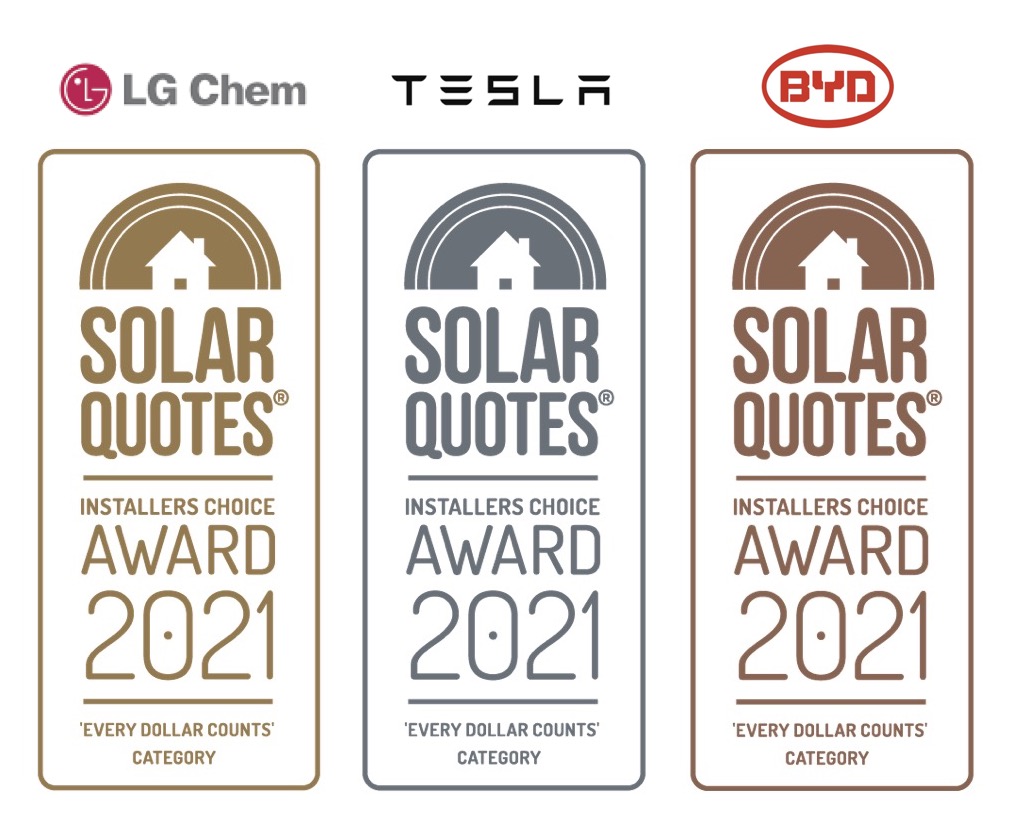
LG get silver for ‘best battery’ and gold for ‘best budget battery’. If you want to save some money, it can be cheaper per kWh to pair a hybrid inverter with LG Chem energy storage. They also make small 6 kWh solar batteries for those who don’t need the full 13.5 kWh in a Tesla Powerwall.
Second Place: Tesla (24.44%)
A good number of installers think you should only go Tesla – and if you can’t afford one, then wait. This quote is typical of installers that voted for Tesla in both categories:
“If money was tight I’d leave the battery off before I went with something other than Tesla.”
Third Place: BYD (16.67%)
BYD is one of China’s biggest battery manufacturers. They also make enormous volumes of electric cars and buses – so they know what they are doing.
The BYD home battery pairs nicely with the Fronius Gen 24 Hybrid inverter for a solid home solar and storage solution.
Here’s where the votes went:
You’ll notice there are 6 votes for ‘none’. These votes came with comments such as these:
“If you’re battling to pay for a battery, probs best not to get a battery ?”
“If money was very tight you shouldn’t consider a battery.”
“If I have a tight budget I would not be installing batteries.”
The best advice I can give is: if you want a home battery, go with a big brand. Big brands have the resources to deliver a high-quality solar battery, and the Quality Assurance processes in place to know when a recall is necessary. Never buy the cheapest battery on the market, and make sure your installer knows what she’s doing.
Related: Read solar battery reviews from Australian customers who have had energy storage systems installed.
Footnotes
- Disclosure: I marched against Shell in the 1980s and still haven’t forgiven them. ↩

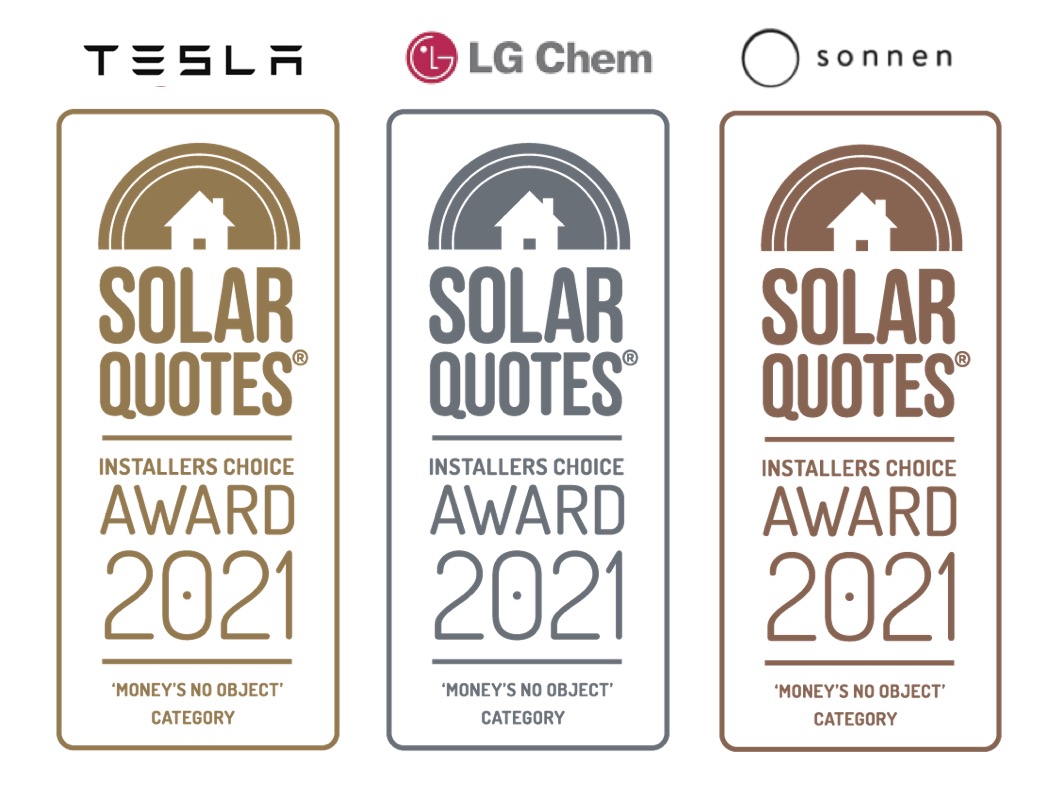
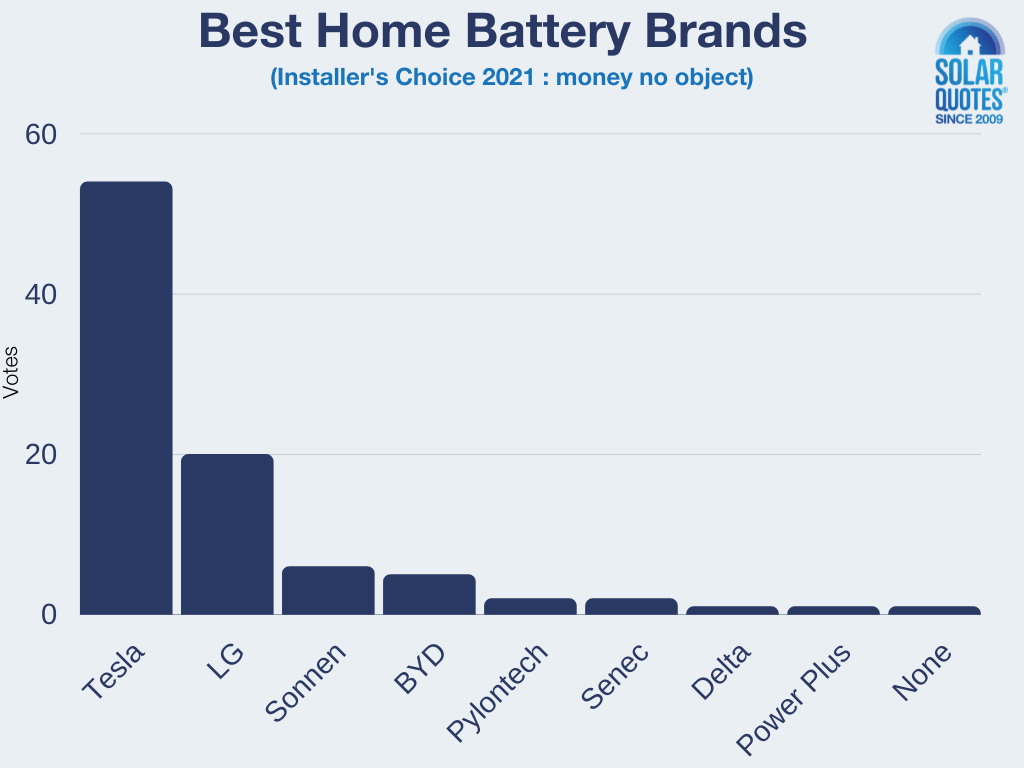
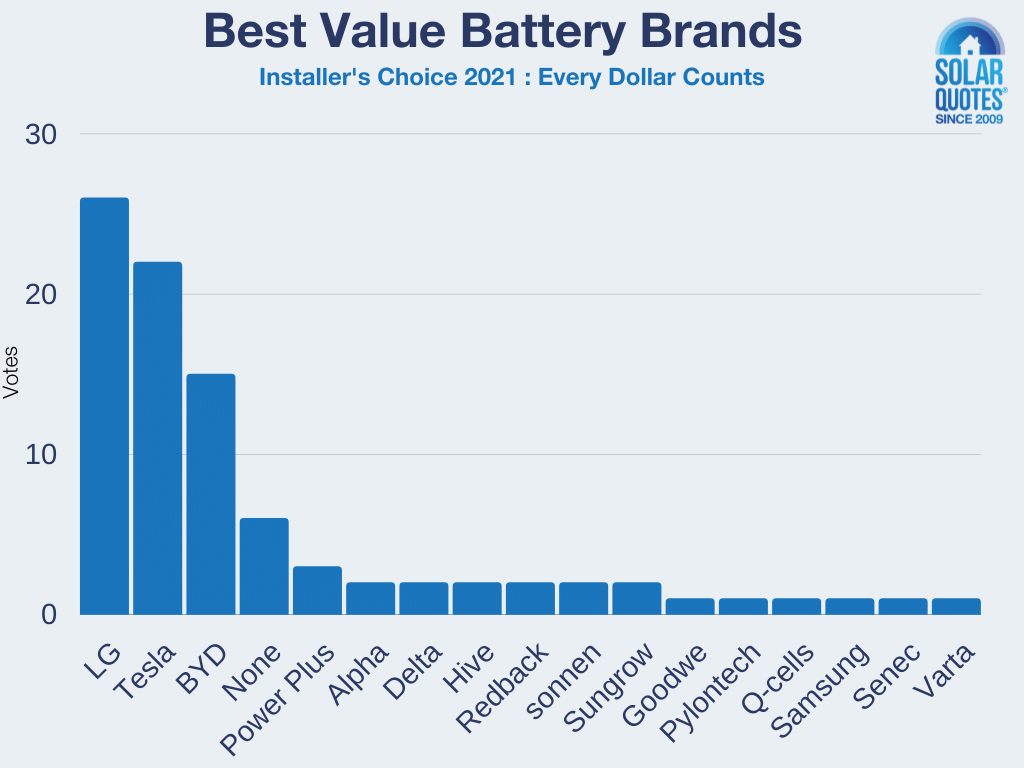
 RSS - Posts
RSS - Posts



I would be keen to know what a similar survey would reveal for off grid situations. I expect since your survey size was only 100 or so for on grid, the numbers for off grid would be much lower, but nonetheless interesting.
Does Musk’s restriction on PW2 battery sales make this comparison worthless?
Doesn’t the requirement that you must install Tesla solar panels, to earn the privilege of a Powerwall2 purchase, rule out the latter, if Tesla panels can’t be purchased in Australia?
That’s only in America.
I have Sharp solar panels installed in 2006 and this year I added Tesla batteries. No one said a word about not having Tesla panels. I live in California.
I am curious Finn, about the danger of the “concentrated energy” in a battery back up system. Maybe you could also say something about making the system as safe as possible beginning with siting the batteries inside or outside one’s home. There might be value for those who have not installed yet! Thanks!
Lithium, Lithium, Lithium, absolutely nothing about “Flow Batteries” or the new tech coming through. Dare I say it, installers prefer the most expensive product for the margins alon3.
So does Solar Quotes. Proven,cheap,reliable and simple battery-banks are available in Deep-Cycle AGM lead-acid batteries. Been using them for near 40 years, and the only attention required was occasional replacement of some component cells ~at UNDER $2 per ah. They can be installed by an aforementioned half-witted chimp in five minutes.
Totally agree. Not a single mention of Zenaji’s lithium titanate batteries which have warranties longer than any Tesla battery and are safer and more cost effective per warrantied cycle. And made here in Melbourne. In this article solarquotes advise you to buy the big brands for home batteries. Hardly objective or useful to installers or even consumers wanting the best products.
Yes I’m from Zenaji. No apologies either ?
My brother has Zenajis, despite being on-grid, and is amazed by their rapid charge and discharge capacity. With 19 kW of panels he can flatten the battery bank overnight, then have it back at 100% by midmorning on sunny days. (We had previously preferred Redflow, but the limited charge transfer rate made them less suited.)
My off-grid owner-build is finally done, but now I need to renovate and sell in town to pay for that and a substantial PV installation – including Zenajis. I can’t find an equal technology for off-grid, let alone anything better.
Hi Lee,
Have you ever seen a residential flow battery installation?
I have. They are big, noisy, expensive and you need 2 for full backup due to the maintenance cycle.
Flow batteries can be great for remote, hot, harsh environments.
Not great for a typical home.
The Powerwall margins are actually slim.
Cheers,
Finn
If margins are slim, then it’s a huge disincentive to stand by that product. Are Micro-inverters recommended for greater longevity and safer operations.
Do you have any commercial agreements with Tesla, LG or any of the other brands you list in this article? That’s actually important to let people know about because they are relying on your impartiality. Can you please let me know. Thank you
Jennifer,
Simple answer: no we don’t.
Have a closer read of the post. The winners are not chosen based on our opinion. They are chosen based on the results of a survey of lots of installers.
Finn
Why does your website spend so much time promoting Tesla if the margins are so slim? Do you have a commercial arrangement or an advertising agreement with Tesla that you should disclose to your readers?
Solarquotes, despite its billions of impressions, lacks integrity and impartiality if it believes it does anything more on its website than sell real estate to the highest bidder.
Would love an answer to that, coming from a journalist with 30 years in the game.
Hi Roy,
Have a closer read of the post – the results are not based on our opinion – it is a survey of lots of different installers.
We do not have any commercial arrangements with any solar panel, inverter or battery manufacturers.
Here’s how we make money:
https://support.solarquotes.com.au/hc/en-us/articles/115000931934-How-does-SolarQuotes-make-money-Will-I-pay-more-for-my-system-by-using-SolarQuotes-
Just to be clear – no one can pay to get a blog post published on SolarQuotes®.
Finn
I am wondering whether, if the “installers” or retailers – the people who get paid for the battery sales and installations, got paid the same fixed amount, for each battery, regardless of the brand and price, the results would be different.
Of course, the most expensive (and least value) brand, would get the highest rating, if the retailer gets a markup, profit, or, the amount, out of the sale price, that goes to the retailer, is a percentage of the price charged by the manufacturer.
Of course, if a retailer gets paid much more, for selling a customer, an overpriced tesla thing, compared to a lesser priced LG or BYD thing, the restailer is going to say that the preference is for the tesla thing.
It is simply, in the financial interest of the retailer, tpo say that, regardless of the merit of what the retailer says.
After all, the retailer/installer, is first and foremost, a salesman, for whom, the amount of money to be made, is the primary concern.
Thus, I expect that, if the retailer/installer made the same amount of money, per battery sold and installed, regardless of the brand of battery, the results would be different.
Bret,
If all these installers cared about was margin – the last battery they would recommend would be the Powerwall – the margins on it are slim.
You may enjoy life more if you spent more time trying to understand people and less time judging people.
Finn
Have the Powerwall 2 installed recently, the software itself is quite clever; it is able to predict how much sunshine we will have the next day and charge at much lower off peak rates for peak consumption. I am not sure about its competition but very happy with power wall performance and its ease of use.
Hi Finn,
Thanks for this interesting analysis. Are we free to use the information in this article for sharing on social media? We will have a link to the integral article here and of course name the source.
If you link to the source that’s fine – but please don’t copy word for word.
Keen on the power wall but concerned if I install one this month and then want to add another later I won’t be able to do that with Tesla’s new policy. I don’t know if it is advisable or even possible to have two different brand batteries running side by side.
Any word yet on when the LG RESU16H Prime will hit the Australian market. Plenty of reviews online and a coming soon response when I contacted LGChem. Similar response from Enphase when I asked about their battery solutions.
Tesla and LG still sit atop the rankings however I predict next year will see a change.
As Telsa have yet to improve on their battery beside increasing the value of it, LG has been able to creep up due to faster adaptation technologies.
As a Off-Grid user I can confirm this to those interested, I reviewed dozens of battery systems and discussed with 15 installers, everything from youtube, online articles, forms and fantastic sites such as this one
Most people that either have or are going to have an Off-Grid setup do not use Tesla, LG and little use BYD.
The best and recommended off Grid setup is classic Lead Acid, or Lithium-ion (Lithium Iron Phosphate).
We use SimpliPhi PHI3.4 in a bank of 5 batteries. Those run the whole household, lights, washing machine, dryer, dish washer, water pump, septic pump, fridge and freezer, microwave, etc.
Marcus!! A man with a brain! WTF are YOU doing here?? I, too have lived off-grid since 1980 (until just recently ~ though I still operate on solar-power), and have consistently agreed with your comments. PROVEN, CHEAP, RELIABLE and SIMPLE L/A batteries with an UNCONDITIONAL warranty (no ‘pro-rata’) are available and offer the reassurance of ease of use/replacement ( eventually). Murphy* tells us that ‘something’ will go wrong with EVERYthing: and replacing a battery-bank @ UNDER $2 per AH (NO ‘expert’ installation required!) is MUCH better value than a multi-thousand-dollar battery which requires a ‘qualified’/commercially-interested ‘expert’ to bolt together as required by warranty conditions. I keep making the point that Hippies (too poor to live on-grid) were doing all this stuff DECADES before the trendy money-grubbers even heard of solar-power!
*https://www.abc.net.au/news/2021-08-03/solar-power-renewable-energy-customers-struggle-to-get-help/100322900
A worthless survey unfortunately unless full disclosure of who voted what and who the survey group was made up of. Given firstly that solar companies listed with SQ are with SQ for the sole purpose of leads and are made of predominantly solar retailers and a lesser degree solar accredited installers and an even lesser volume of battery accredited installers, therefore the bulk have not had any real or valid battery experience for a worthwhile period of time either or any real volume.
So simply put unless disclosure of the actual voters to ascertain validity, otherwise until then the outcome is purely subjective and could just as well been a survey for the open public.
Regardless it does sound a bit like doing a survey with combustion engine mechanics and asking them which EV car they would buy with an unlimited budget or a tight budget… pointless unless the right questions were asked and these 2 aren’t.
I look forward to a cheeky response and then being screened from responding to it!
Either way have a great day…
I have done the maths on batteries and came to the conclusion that it would take 20 years for it to just save me the cost of just the battery. Also the amount of cycling would be up in less than 10 years which was the warranty period.
All up Battries in Australia are to expensive for the cost of power which is sad as we have some of the most expensive power in the world. This was on a $7000 setup
The amount of battery advancements at the moment are quite amazing, so much so that buy any current market leading battery is not a great idea. If there was a reasonably priced plan that updated your technology at a fair and equitable price, to even justify buying the hardware people would take up batteries in a heartbeat.
The power companies are expecting you to run the risk and expense for 7.5/kwt. Ahh I think in any mans view, its a tad rich.
Lead acid batteries don’t do well where it’s cold. If you flatten them completely they may not recover. Truth is there may not be any battery system that suits you. I’m often left using the computer which has a lithium battery installed on it. When the external system has died it keeps going.So might I suggest go for something better than lead acid batteries. I’m trying to help newcomers to this problem as I’ve seen many newcomers show me their massive lead acid battery collection with pride only to have it die within a year or two. Some worth 7000 dollars. Then they return to the city to pay for the exorbitant cost of connected power. Really my experience is that there’s no cheap simple solution to batteries yet. Prove me wrong !
I am of the opinion that ALL Australian retailers charge as much as feasibly possible with little value in the mix. Its the “Australian Way”. There is very little value in most consumer high ticket items, only “Hope” not planned customer expectation. Yes, “jaded, bitter” and dare I say it “twisted” that I may be, but a realist if nothing else.
Hi Finn
Hi have just installed a 8Kw Gen 24 Fronius Inverter with 10 Kws of LG panels. I have just discovered that Synergy does not provide a rebate for any exported power, because my inverter exceeds 5Kw. So now considering whether I should install a battery. My quarterly Synergy bill is circa $200 despite me exporting 2400 Kw to grid with no reward. Is installing a battery, perhaps an LG Chem, worthwhile.
Hi Maurice
Even in your situation where your exported electricity is basically being stolen, a home battery is unlikely to break even on electricity bill savings alone at current prices. But if you place a high value on the backup capability it can provide may decide it’s worthwhile. An LG Chem battery is an option, but since you already have a solar inverter you may want an AC coupled battery such as a Powerwall 2.
Of course, you can always wait and see if battery prices improve, as I’m sure they will. It just may take time. Because of raw material shortages I’m not expecting battery price falls very soon — but I could be surprised.